
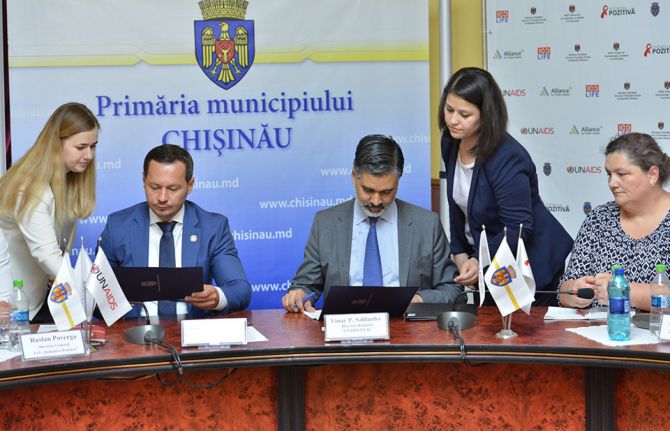
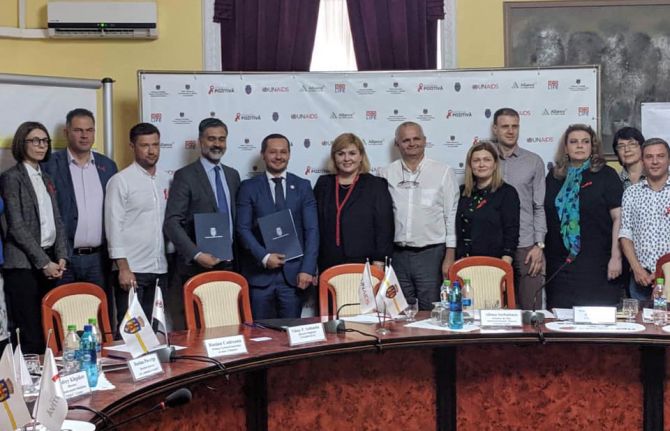
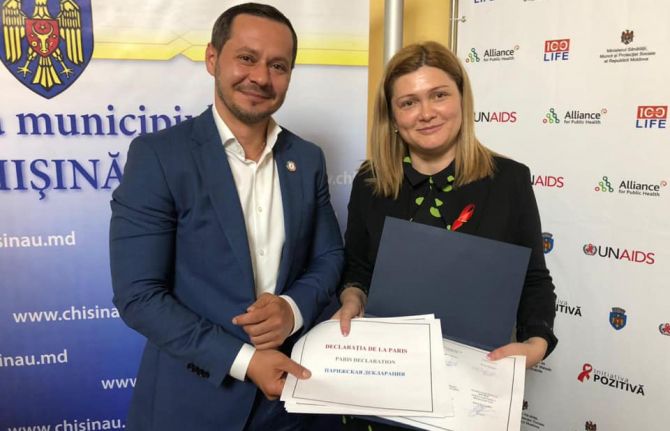
Feature Story
Chisinau signs the Paris Declaration
04 June 2019
04 June 2019 04 June 2019Ruslan Codrenu, the Acting Mayor of Chisinau, Republic of Moldova, signed the Paris Declaration to end the AIDS epidemic in cities on 31 May. He committed the city to achieving the 90–90–90 targets by 2020, whereby 90% of all people living with HIV know their HIV status, 90% of people who know their HIV-positive status are on treatment and 90% of people on treatment have suppressed viral loads. The city will specifically focus on marginalized and vulnerable people and on ending stigma and discrimination.
“Achieving 90–90–90 will be difficult, but it is never too late to start making the necessary changes to improve people’s lives and health. Today, the city authorities commit to significantly increasing the coverage of the residents of Chisinau with HIV prevention, testing and treatment services, with the aim of ending the AIDS epidemic and concentrating efforts on programmes for key populations,” said Mr Codrenu.
Mr Codrenu said he expects that a new municipal HIV control programme for 2019–2020 will soon be adopted by the city council. The programme will focus on additional HIV testing and treatment for approximately 750 people living with HIV and the provision of HIV prevention services for key populations.
“Chisinau must move quickly, not only to reach 90–90–90, but also to eliminate discrimination against people living with HIV and key populations, which remains a significant barrier. In this struggle, our city is not alone. Chisinau is supported by a team of regional and national leaders who are willing to share their expertise,” said Svetlana Plamadeala, UNAIDS Country Manager for the Republic of Moldova.
Chisinau already supports a range of HIV prevention programmes for key populations, including harm reduction and opioid substitution therapy programmes for people who inject drugs, rapid HIV testing and condom distribution for sex workers and their clients and condom distribution among gay men and other men who have sex with men. However, it is planned that with the adoption of the new municipal HIV control programme, the quality, coverage and impact of the programmes will be significantly enhanced.
Chisinau is the seventh city in eastern Europe and central Asia to sign the Paris Declaration, which since 2014 has been signed by more than 300 cities worldwide.
The signing of the Paris Declaration in Chisinau is the most recent result of a long history of effective cooperation between national, state and nongovernmental organizations, regional networks representing key populations and international organizations
According to government estimates, there are about 3200 people living with HIV in Chisinau.
“Today, we witness what can be achieved through political will. It is of paramount importance to us that the Paris Declaration is not another declarative statement, but is followed by the adoption of the municipal HIV programme, with specific and measurable goals and roles and a budget,” said Ruslan Poverga, General Director of the Positive Initiative.
Related information
Region/country
Related

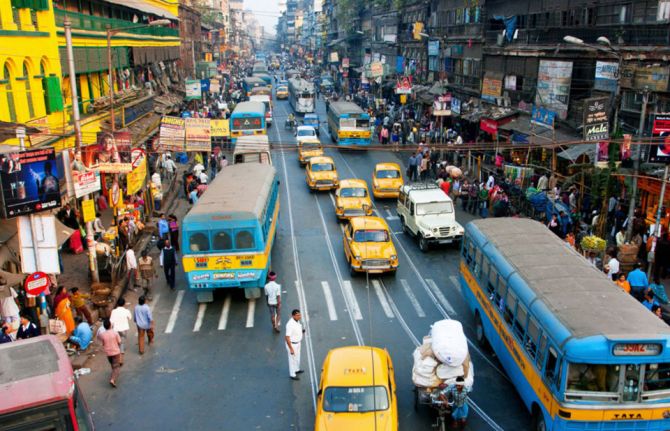
Feature Story
HIV: a heavy burden on many cities
08 April 2019
08 April 2019 08 April 2019Cities play a critical role in both the HIV epidemic and the response. More than half of the world’s population currently live in cities, and in most countries, cities account for a large and growing proportion of the national HIV burden. City dynamics and networks can contribute to an increased risk of HIV transmission, but cities offer advantages and important opportunities for programming, effective action and innovations to end AIDS.
Of the 10 priority cities included in the first year of the joint UNAIDS and International Association of Providers of AIDS Care Fast-Track Cities Project, up to 25% of the national HIV burden rests in just one city. A quarter of all people living with HIV in Rwanda live in Kigali, and while the population of Jakarta represents only 4% of the total population of Indonesia, the city accounts for 17% of the national HIV burden.
The Fast-Track Cities Project is providing essential strategic technical support to selected high-burden cities in order to assist them to reach the 90–90–90 targets and end AIDS in cities by 2030.
Related information
Related

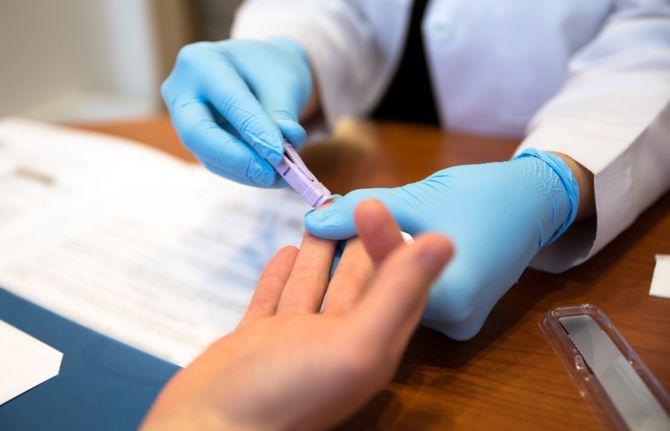
Feature Story
United Kingdom pledges to end HIV transmission in the country within 10 years
07 February 2019
07 February 2019 07 February 2019The United Kingdom of Great Britain and Northern Ireland has announced that it will end the transmission of HIV in the country within 10 years—an announcement that was warmly welcomed by UNAIDS.
In 2016, all United Nations Member States pledged to end AIDS by 2030 in the United Nations Political Declaration on Ending AIDS. This recommitment from the United Kingdom is welcome news that the country remains determined to achieve that goal.
The United Kingdom has dramatically stepped up its efforts to respond to HIV in recent years, resulting in a 28% decline in new HIV cases in the past two years alone. However, the government says it can do more.
The Secretary of State for Health and Social Care, Matt Hancock, launched the campaign, which is backed by an additional £600 000 from the Public Health England HIV Prevention Innovation Fund, at the AIDSfree Cities Global Forum in London on 30 January. The £600 000 will be used to support 14 volunteer organizations that are spearheading new approaches to HIV prevention and will focus on engaging at-risk or underserved communities.
Also at the event, the Secretary of State for International Development, Penny Mordaunt, made a bold declaration about the country’s commitment to ending AIDS globally. “While the world has made great strides in tackling HIV and AIDS, we need to step up our efforts,” she said. “We passionately believe we can create an AIDS-free future for the whole world. That’s the scale of our ambition.”
The United Kingdom Government has played a leading role in the global response to HIV since the start of the epidemic. It has invested £1.2 billion in the Global Fund to Fight AIDS, Tuberculosis and Malaria and is expanding access to antiretroviral therapy though UK Aid, a five-year, £150 million, programme set up to change the lives of more than 3 million of the world’s poorest people.
“This announcement is a further example of how committed the United Kingdom really is to ending AIDS. Not only in the United Kingdom, but around the world,” said Tim Martineau, Deputy Executive Director of UNAIDS, Programme, a.i. “UNAIDS has worked closely with the United Kingdom since 1996 and we look forward to continuing that partnership to ensure that every penny invested brings us one step closer to ending AIDS.”
The event in London was part of the AIDSfree Appeal, a campaign led by the Elton John AIDS Foundation and the London Evening Standard and Independent newspapers. The money raised from public donations through the appeal will be used to support Elton John AIDS Foundation projects in six key cities around the world—Atlanta, United States of America, Delhi, India, Kyiv, Ukraine, London, Maputo, Mozambique, and Nairobi, Kenya. Through UK Aid Match, the United Kingdom Government has pledged to double public donations up to £2 million, to be spent on projects in Maputo and Nairobi.
The AIDSfree Cities Global Forum welcomed leaders from the six cities, who spoke about their hopes for the future. The event was a prelude to the Fast-Track Cities Global Conference, taking place in London in September 2019, at which representatives of more than 275 Fast-Track cities will convene as the first global gathering of cities accelerating their work to end AIDS as a public health threat.
The Fast-Track cities initiative was launched by UNAIDS in 2014 in partnership with the City of Paris, the International Association of Providers of AIDS Care and UN-Habitat to provide support to cities to Fast-Track their HIV responses and end their AIDS epidemics by 2030.
London signed up to the Fast-Track cities initiative in 2018. New HIV infections in the city have fallen by more than 40% in recent years and London has surpassed the 90–90–90 targets—whereby 90% of people living with HIV know their HIV status, 90% of people who know their HIV-positive status are accessing treatment and 90% of people on treatment have suppressed viral loads—having already reached 95–98–97, a remarkable achievement.
“We are eager to take the lessons learned at the forum to a wider gathering of Fast-Track cities later this year in London that will take the measure of progress made and challenges still to be addressed,” said José M. Zuniga, President and Chief Executive Officer of the International Association of Providers of AIDS Care.
Region/country


Update
Yekaterinburg to be the first Russian city to sign the Paris Declaration
20 November 2018
20 November 2018 20 November 2018The Mayor of Yekaterinburg, Alexander Vysokinsky, has announced that Yekaterinburg will become the first city in the Russian Federation to sign the Paris Declaration to end the AIDS epidemic.
In signing the Paris Declaration, Yekaterinburg will commit to putting the city on the Fast-Track to ending the AIDS epidemic through reaching the 90–90–90 targets, whereby, by 2020, 90% of people living with HIV will know their HIV status, 90% of people who know their HIV-positive status will be accessing treatment and 90% of people on treatment will have suppressed viral loads.
According to government statistics, more than 22 000 people are living with HIV in Yekaterinburg.
In announcing the decision to sign the Paris Declaration, Mr Vysokinsky noted that the initiative will encourage innovations and cutting-edge treatment programmes to address HIV and other health challenges and will contribute to a better life for future generations.
Since the launch of the Fast-Track cities initiative on 1 December 2014, about 300 cities and municipalities around the world have signed the Paris Declaration. Leaders in those cities have recognized that their strategies for responding to the AIDS epidemic also offer them a platform to address the need for social inclusion, public services, primary health care and community mobilization.
Quotes
“AIDS is a challenge that needs to be addresses in any large city. In Yekaterinburg, we are talking about HIV, we are taking concrete steps and as a Fast-Track city we are committed to reach the 90–90–90 targets by 2020.”
“UNAIDS welcomes the decision of Yekaterinburg to join the Paris Declaration and to achieve a breakthrough in the city’s response to HIV. We hope that Yekaterinburg will be the first of many cities in the Russian Federation to join this initiative, which can help to change the trajectory of HIV infections in a country.”
Region/country
Related

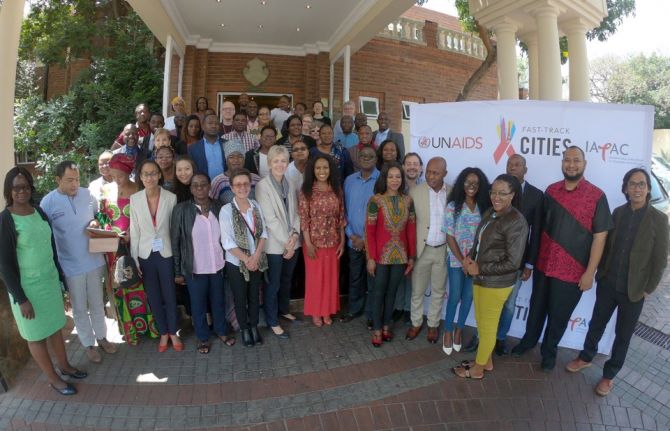
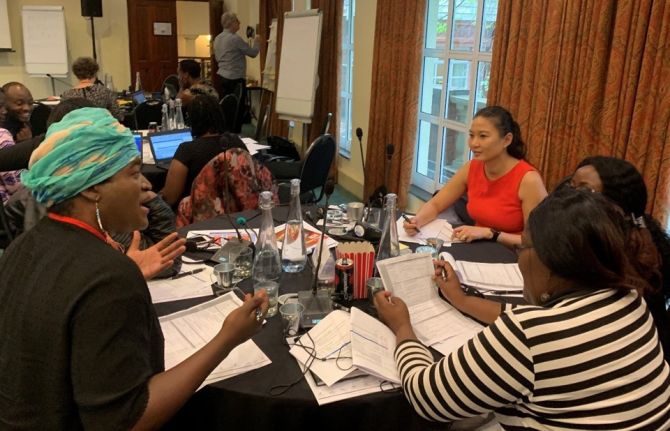
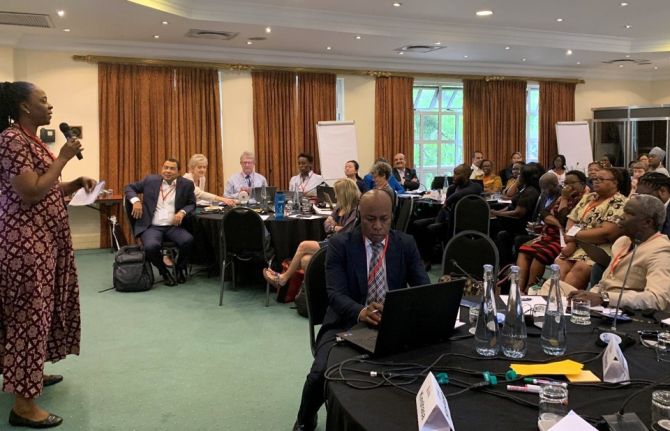
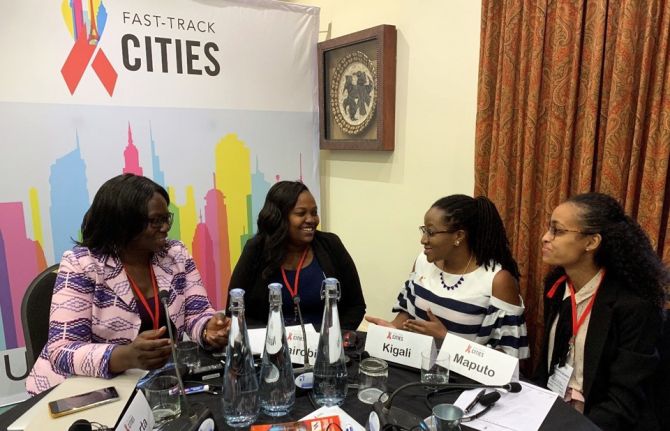
Feature Story
Learning from city-level approaches to putting the HIV response on the Fast-Track
09 November 2018
09 November 2018 09 November 2018The Paris Declaration to end the AIDS epidemic in cities has gained political momentum among city leaders to commit to ending AIDS and to address disparities in access to health and social services. To date, about 300 cities and municipalities around the world have signed the declaration.
Sponsored by USAID through the United States President's Emergency Plan for AIDS Relief, a joint UNAIDS and International Association of Providers of AIDS Care Fast-Track cities project was designed to provide essential and strategic technical support to priority high-burden cities to accelerate the AIDS response and deliver on the commitment of the Paris Declaration. Ten cities, represented by local governments, civil society organizations and development and other partners, gathered in Johannesburg, South Africa, on 2 November to reflect on experiences and lessons learned during the first year of implementation of the project.
In all 10 cities, political leadership of the HIV response has been mobilized and city health departments are actively engaged in leading the response to HIV. In addition, the projects are receiving high-level support from local and national governments, as well as national AIDS councils. In Yaoundé, Cameroon, the project has provided an opportunity to convene partners on a regular basis, under the leadership of the seven city mayors, to improve coordination of activities, address potential overlap and review progress.
The project is contributing to innovation in cities. In Jakarta, Indonesia, concept testing of mobile solutions has identified an effective and relevant approach to reaching young people and a mobile application is being developed to reach young gay men and other men who have sex with men with key messages related to HIV testing, prevention and support.
“Cities present their own unique advantages to building a multisectoral approach to HIV and can benefit from social transformation opportunities associated with a strong AIDS response. Equity, inclusiveness, resilience and sustainability are not only key to a successful health-care strategy, they are also the building blocks to a thriving city,” said Catherine Sozi, Director of the UNAIDS Regional Support Team for Eastern and Southern Africa.
Civil society is actively engaged in the 10 cities. In Kinshasa, Democratic Republic of the Congo, civil society has been active in the implementation of the project, in advocacy meetings with political leaders, national authorities and other partners, on issues related to stigma, discrimination and human rights. The Kigali, Rwanda, team highlighted the support by the project to the strategic outreach activities to provide HIV services to key populations, including distribution of more than 10 000 condoms in three different locations.
“Through the condom kiosk project with the city government, we were able to successfully reach key populations in Kigali,” said Uwase Nadège, Programme Manager of the Kigali Hope Association. “People who access these services trust others from the community, and we see this as a way to meaningfully engage with the government to Fast-Track the response.”
In Durban and Johannesburg, South Africa, the project is receiving high-level political support from local as well as national governments. In Johannesburg, the project will support the establishment of a city AIDS council, with the key goal of coordinating the HIV response in the city.
Durban, Jakarta, Johannesburg, Kigali, Kinshasa, Lusaka, Maputo, Mozambique, Nairobi, Kenya, Windhoek, Namibia, and Yaoundé are the first 10 cities participating in the project.
Resources
Region/country

Feature Story
Ecuador innovates around HIV prevention in its cities
07 November 2018
07 November 2018 07 November 2018Surrounded by the stately centuries-old buildings of Quito’s Old City, a group of men are playing a modified game of Jenga. Each wooden brick they carefully extract from a tower corresponds to a sexual health lesson. There’s rapt attention while the peer educator demonstrates how a female condom is used. One table over, young people are gathered around for a male condom demonstration. People might stop by the tents for blood pressure or blood sugar tests, but they stay for the lively safer sex education.
This hands-on engagement is a result of collaboration between the Directors of Health and Social Inclusion for the Municipality of Quito and civil society organizations, including the Kimirina Corporation. Two years after becoming the first Andean city to sign the Paris Declaration to end the AIDS epidemic in cities, Quito has dramatically scaled up HIV testing and prevention programmes. Four hundred kilometres away, the city of Guayaquil is following suit, expanding HIV prevention and community testing.
Over the past year there has been a renewed emphasis on community testing, with concrete results. The proportion of newly diagnosed people being linked to health services has increased by a quarter in Quito and a third in Guayaquil.
“You are not just talking about the epidemic, but also using practical approaches,” UNAIDS Executive Director Michel Sidibé said during a visit to Ecuador on 30 October. “We are seeing people being educated, accessing services and getting tested. Anything we do with the support of the community is sustainable.”
This emphasis on community involvement is a key feature of the new Ecuador Multisectoral National Strategic Plan on HIV. During the plan’s symbolic launch on 30 October, Ecuador’s Public Health Minister, Veronica Espinosa, emphasized that the missions to end AIDS and to build a better society were one and the same.
“We are working to ensure a life without prejudice and the right to health for all without discrimination,” said Ms Espinsosa.
And the human rights-based approach to HIV services does not end with citizens of Ecuador. Ecuador has shown great leadership with regard to migrants, including guaranteeing health care for refugees and migrants living with HIV.
“You have opened your hands and heart to people coming from other places,” said Mr Sidibé. “By giving treatment access to people who could be left behind you are demonstrating that you set a high standard, not only for yourselves but for the world.”
Region/country

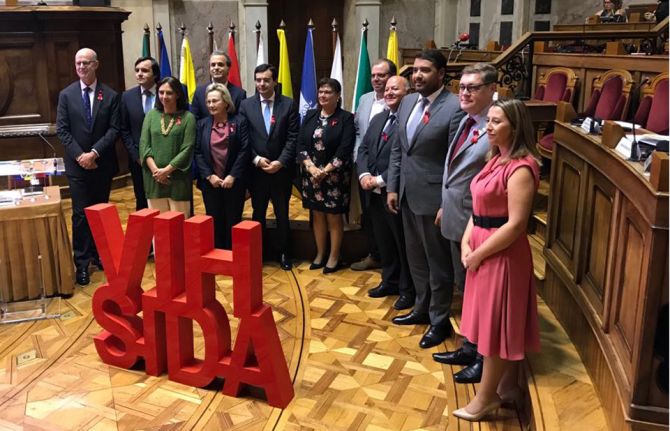
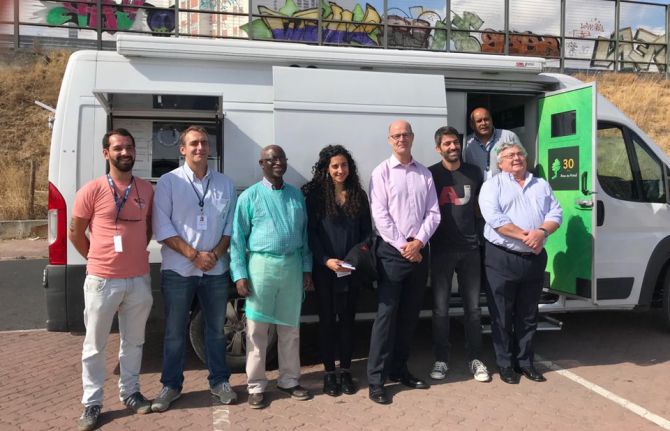
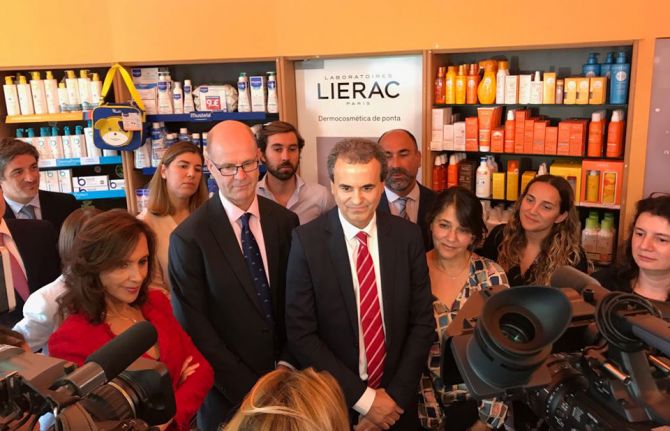
Update
More Portuguese cities commit to the Fast-Track
12 October 2018
12 October 2018 12 October 2018On 10 October, the mayors of the Portuguese cities of Almada, Amadora, Loures, Odivelas, Oeiras, Portimão and Sintra signed the Paris Declaration to end the AIDS epidemic in cities. Joining Cascais, Lisbon and Oporto, 10 Portuguese cities have now signed the declaration. In signing the Paris Declaration, mayors commit to putting their cities on the Fast-Track to ending the AIDS epidemic.
Portugal has been a pioneer in the AIDS response since the outset of the epidemic, creating enabling legal environments, enacting progressive drug policies and making HIV treatment free for all, regardless of their migration status. Portugal continues to lead today, driving community-based care models and promoting better integration of health-care services.
During a site visit in Cascais, Portugal, Tim Martineau, UNAIDS Deputy Executive Director, a.i., saw the nationwide launch of an initiative that aims to bring HIV services closer to the people who need them: HIV testing in community pharmacies. This initiative was integrated into the Cascais Fast-Track City Strategy. Self-testing is set to become available later this year, since the necessary legislation was just approved by the Portuguese Government
During his trip to Portugal, Mr Martineau also visited the Mobile Outreach Program of Aires do Pinhal – Association for Social Inclusion. With the support of the Ministry of Health, since 1986 the programme has provided harm reduction and social support services to people who inject drugs, giving access to services to about 1200 people daily. Services—including screening and treatment for HIV, hepatitis C, tuberculosis and syphilis, as well as methadone delivery, syringe exchange and distribution of condoms—are provided free from discrimination to people regardless of their nationality, including undocumented migrants.
The signing ceremony for the Paris Declaration was held at the Pálacio de São Bento in Lisbon, Portugal, and was attended by the Director-General of Health, Graça Freitas, Mr Martineau and representatives of civil society. In his closing speech, the Secretary of State, Fernando Araújo, expressed his hope that Portugal would continue to show leadership in the Fast-Track response to HIV.
Region/country


Feature Story
Cities in Philippines pledge to lower HIV infections and improve their track record
14 August 2018
14 August 2018 14 August 2018The League of Cities of the Philippines (LCP) pledged to fast-track the AIDS response in the cities, by signing a partnership agreement with UNAIDS to reduce the number of new HIV infections in the country. The signing event took place on the fringe of the LCP’s 30th anniversary celebrations on 27 July 2018. More than 145 mayors and local representatives from cities attended the event, which included a gala dinner.
UNAIDS’ newly released report, Miles to go: closing gaps, breaking barriers, righting injustices, shows that the annual new infections have more than doubled in the Philippines in the past seven years to an estimated 12,000 in 2017. With a 174% increase since 2010, the Philippines is the country with the fastest growing HIV epidemic in the Asia and the Pacific region. New infections have now overtaken Thailand, Viet Nam and Myanmar, placing Philippines number 5 in terms of new infections in 2018 in the region. Cities and urban areas are particularly affected. Health authorities say that 70 cities, including the 17 cities in metro Manila, accounted for 80% of reported HIV cases in the country.
“The AIDS epidemic in the country is an issue that needs urgent action among local governments, especially since key populations at risk of infections reside mostly in the cities,” said Laarni L. Cayetano, National Chair of the League of Cities of the Philippines.
Most agreed that there is a need to scale-up services tailored to key populations that go beyond female sex workers. More than 90% of new HIV infections are occurring among men who have sex with men (MSM) and transgender people (TG). Condom use among men who have sex with men and transgender people hovers at 50% and 37% respectively and HIV testing is low. Only 16% of MSM knew their HIV status in 2015.
Local governments in the Philippines have earmarked resources and started more innovative HIV prevention services. For example, Quezon City has opened three Sundown clinics (Klinikas) that provide rapid HIV testing and counseling in a non-stigmatizing environment for gay men, men who have sex with men and transgender people. The city has also increased its HIV funding nine times since 2012 and has been urging other provinces to follow suit.
“Philippines has a small window of opportunity to act fast and stop a major HIV epidemic from taking hold,” said Eamonn Murphy, UNAIDS Regional Director for the Asia and the Pacific. He added, “This commitment is achievable if cities where the epidemic is having a big impact take the lead.” He also reaffirmed UNAIDS commitment to work in close partnerships with national and local authorities to support their efforts to bring HIV infections under control and provide technical expertise in how best to invest funds and reach people.
For the National President of the League of Cities of the Philippines, Edgardo D. Pamintuan, time is of the essence. “I strongly believe that if we effectively implement HIV response strategies in our localities though our partnership with UNAIDS, our efforts at the city level can make a significant impact in reaching the country’s targets,” he said.
Fast-Track cities
Region/country
Related

Feature Story
Monaco becomes a Fast-Track city
09 July 2018
09 July 2018 09 July 2018Monaco has joined a network of more than 250 cities worldwide by signing the Paris Declaration, making a commitment to Fast-Track its response to the HIV epidemic and adopt the 90–90–90 targets.
The 90-90-90 targets are that, by 2020, 90% of all people living with HIV will know their HIV status, 90% of all people living with HIV will have access to antiretroviral therapy and 90% of all people on antiretroviral therapy will have viral suppression.
At a ceremony attended by Princess Stephanie of Monaco, who is also the President of Fight AIDS Monaco and a UNAIDS International Goodwill Ambassador, the Mayor of the Principality, Georges Marsan, stressed the importance of testing as the entry point to getting people on treatment and keeping them healthy.
Twice a year since 2012, Monaco has taken its HIV testing campaign to the streets of the principality through its Test in the City campaign. In his speech, the mayor also underlined the importance of preventing new HIV infections.
In his remarks at the event, UNAIDS Executive Director Michel Sidibé recalled visiting South Africa with Princess Stephanie in 2009, when just several hundred thousand people in the country had access to antiretroviral therapy to keep them alive and healthy. Today, he said, that number has expanded to 4.3 million people.
Mr Sidibé added that cities had a vital role to play as hubs of innovation and research and that they could help reach forgotten groups of people at risk of HIV infection.
Also present at the event were Monaco’s Minister of Health and Social Affairs, Didier Gamerdinger, and the Vice-President of the International Association of Providers of AIDS Care, Bertrand Audoin.

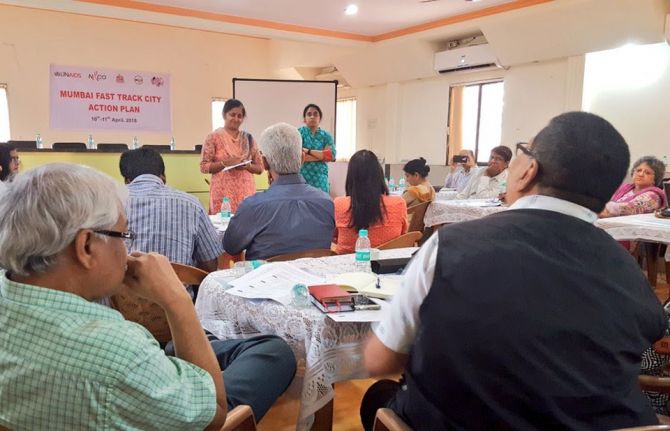
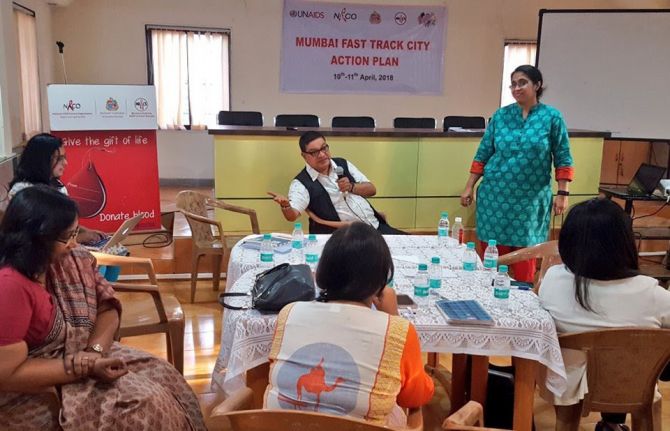

Feature Story
Mumbai Fast-Tracks AIDS response by spearheading innovations to end epidemic by 2030
19 April 2018
19 April 2018 19 April 2018Population growth and fast urbanization, fuelled by sustained immigration and accelerating mobility, are rapidly changing the socioeconomic and behavioural patterns of people in big cities.
Mumbai, a city of 12 million people, was one of the first cities to sign up to the Fast-Track cities initiative, launched in Paris on World AIDS Day 2014. Since then it has rapidly adopted measures to accelerate progress towards achieving the Fast-Track 90-90-90 treatment targets. However, the challenge today goes beyond scaling-up efforts to attain the 90-90-90 targets. Efforts to end AIDS must also focus on effective use of combination HIV prevention and eliminating the stigma and discrimination that impede universal access to health services.
The Mumbai District AIDS Control Society and UNAIDS brought together more than sixty participants from government, international and civil society organizations from 10 to11 April to identify innovative strategies to expand HIV prevention and treatment service coverage in the megacity.
Participants noted that growing inequalities in the urban environment were forcing people to take risks to survive. Sex workers, people who inject drugs, men who have sex with men and transgender people (Hijras) who are already at higher risk of HIV infection are particularly negatively impacted by these trends.
Urban gentrification is pushing key populations out of areas where they had previously gathered making the task of delivering HIV services more complicated. As populations have become more dispersed and hidden, traditional HIV prevention outreach approaches using peer workers have become less effective.
Reflecting on these challenges, participants noted that with change came opportunity. More systematic compilation of data and granular analysis has helped identify locations and populations where risk and vulnerability are greatest. According to city officials, improved data and understanding is helping to refine their approach to HIV prevention interventions. New packages of services designed through the profiling of newly emerging risk behaviours are being planned.
To further Fast-Track the AIDS response, several new approaches have been introduced. Community-based HIV screening helps to accelerate diagnosis and treatment of people living with HIV. Similarly, in growing slum areas mobile vans offering HIV testing services provide the opportunity to large numbers of people to know their HIV status.
While social media platforms are proving a cost-effective means to improve HIV awareness and connect people to prevention and treatment services, Mumbai authorities are convinced that more innovative communication strategies are also necessary. They plan to use social and mass communication media to mobilize support to ‘normalize’ AIDS as a chronic disease and prevent new HIV infections. HIV champions will target a range of different audiences including adolescents and young people to amplify HIV prevention messages.
All participants agreed that efforts to scale up access to HIV services need to be led at a faster pace as “there is no time to lose” to end AIDS by 2030.

















